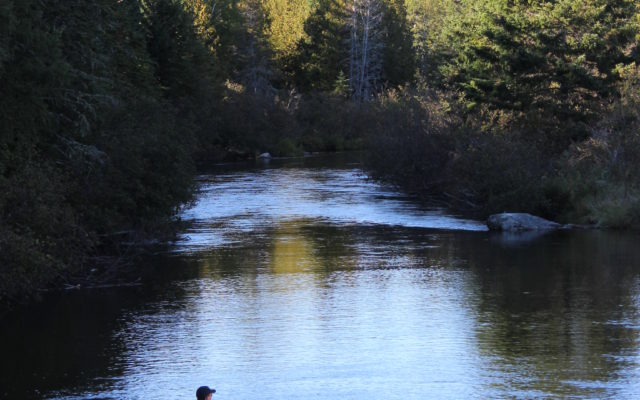
Trout Unlimited to stage 2020 national meeting in Bangor
Fisheries conservationists from around the country will converge on Bangor in August, as Trout Unlimited will stage its national annual meeting in the Queen City of the East Aug. 19-23, 2020.
Hundreds of volunteers are expected to attend, learn about conservation efforts that have succeeded in Eastern Maine and discuss coldwater conservation issues with their peers, as well as staffers, scientists and partners from state and federal agencies.
The 2019 annual meeting was held in Rogers, Arkansas. Maine previously hosted the event in the early 2000s. That meeting was held in Portland.
Jeff Reardon, the Maine Brook Trout Project director for TU, said he was excited to welcome national TU members back to the Pine Tree State. Maine TU officials are just getting geared up for the meeting, he said.

Bangor Daily News file photo/John Holyoke
NATIONAL TROUT UNLIMITED MEETING — An angler fishes the Roach River in Kokadjo in late September. Fisheries conservationists from around the country will converge on Bangor in August, as Trout Unlimited will stage its national annual meeting in the Queen City of the East Aug. 19-23, 2020.
“This is a big deal for us in Maine,” Reardon said. “A small group of us are currently working with staff from the national office on planning for the event, but that’s literally started in the last week. [There are] lots of details still to be worked out I think it’s safe to say that the conservation tour will include some stops at the Penobscot dams that were removed or bypassed [as part of the Penobscot River Restoration Project, of which TU was a partner].”
That project resulted in the removal of two dams and the bypass of another on the Penobscot, and resulted in renewed access to 1,000 miles of river and stream habitat that had previously been inaccessible to migrating fish.
Because of that project, anglers can now fish for sea-run species like American shad and striped bass in areas they had been unable to swim to for more than 100 years.
Trout Unlimited has 300,000 members nationally and six chapters here in Maine. The organization stresses the importance of coldwater fisheries and works to conserve them. Their motto is “Take care of the fish and the fishing will take care of itself.”
David Huntress, the secretary of the Maine Council of Trout Unlimited, said national TU officials approached those in Maine last year to see if Maine was interested in hosting the meeting. He said he expects about 200 TU members to come to Bangor for the event.
Maine has been recognized as the last, best chance for brook trout conservation in the continental U.S., and the Maine Department of Inland Fisheries and Wildlife says the state has more than 1,200 lakes and ponds that are managed for brook trout.
In 2006, TU released a report that highlighted the status of brook trout in the Eastern U.S. Among the findings: 97 percent of the region’s intact wild brook trout populations in lakes and ponds existed in Maine.
According to the organization’s website, attendees will be treated to fishing opportunities in eastern Maine, including outings for trout and smallmouth bass. Chief Executive Officer Chris Wood will be on hand for a “State of Trout Unlimited” address.
On the schedule of events:
Wednesday, Aug. 19, will be an optional day of fishing, during which attendees will be paired with local TU volunteers, who will take them to some of their favorite fishing spots.
Thursday, Aug. 20, will feature a conservation tour. Attendees will learn about Maine’s plentiful coldwater trout streams and hear about habitat that has been reopened for migratory fish. The Penobscot River, site of the Penobscot River Restoration Project, will be one area of interest.
Friday, Aug. 21’s programming will include TU’s National Leadership Council business meetings throughout the day. A conservation luncheon and Q & A session with TU’s senior staff. In the evening, a volunteer awards dinner will be held.